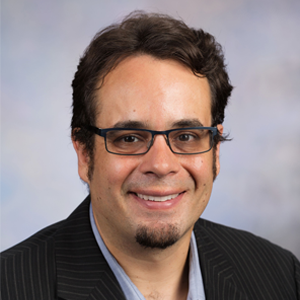The University of Florida College of Education has appointed three UF faculty to the esteemed Irving and Rose Fien Endowed Professorship — John Kranzler, professor and director of the School Psychology Program, Holly Lane, associate professor of Special Education and director of the UF Literacy Institute (UFLI), and Walter Leite, professor of Research and Evaluation Methodology and director of the Virtual Learning Lab.
The two-year professorship honors nationally and internationally recognized faculty whose research improves education outcomes for children. Appointed faculty receive $10,000 annually to support research and travel expenses, for a total award package of $20,000 each.
Throughout the professorship, Kranzler, Lane and Leite will continue developing and enhancing a range of established research endeavors to advance fairness, literacy and equity.
Learn more about each of their intended research endeavors below:
 Kranzler’s research agenda centers around intelligence and its assessment, specifically in identifying children who are struggling in school and may have a specific learning disability (SLD).
Kranzler’s research agenda centers around intelligence and its assessment, specifically in identifying children who are struggling in school and may have a specific learning disability (SLD).
Within the field of school psychology, SLDs are considered the most prevalent disability facing children. Kranzler explains that there are three current models used to identify SLDs – IQ Achievement Discrepancy (IAD), Response-to-Intervention (RtI) and Patterns of Strengths and Weaknesses (PSW). While they each share common features, they differ greatly in their use of intelligence tests, how these tests are interpreted and the distinct SLDs they actually identify.
“They all have different assumptions, they all have different methods and I think they all identify a somewhat different group of kids,” he said.
The field’s use of multiple methods of identification has led to disagreement and discrepancies on the most appropriate means to identifying children with an SLD, and the RtI model, specifically, has even been shown to over-identify children because it identifies weaknesses in general cognitive ability based on the level of abilities and achievements same-age or same-grade peers are expected to have.
To address these concerns, Kranzler has been exploring the validity and utility of these methods for more than five years and is developing a novel approach that uses the PSW approach and its most prevalent model the Dual-Discrepancy/Consistency Model, which defines an SLD as an unexpected underachievement and corresponding weakness that is related to areas of academic weakness.
“An intellectual disability is overall weakness in cognitive processing, but an SLD is a narrow area,” he said. “So the idea is that there are many cognitive abilities, and we could measure them, and if we identify one that’s weak and it’s known to be connected to or at least empirically related to this academic difficulty, then that could be evidence of a learning disorder.”
Taking into account that students rarely have equal ability or academic aptitude, his proposed approach is the use of a Modified Hybrid Model that identifies an SLD when a student’s academic performance falls far below the level predicted based on general cognitive ability.
“This new model that I have in mind, it’s using this RiI approach, but instead of using the general classroom as a comparison, I want to tailor that to kids’ own cognitive ability levels,” he said.
Under the professorship, Kranzler will conduct two studies to expand his findings and examine the effectiveness of his proposed model in action. The first study will leverage full-length IQ tests to explore the general and broad cognitive abilities of 100 elementary students who have previously been identified using the RtI model as having an SLD as their primary disability. The second study will then test the utility of the Modified Hybrid Model in identifying students’ unexpected underachievement at all levels of cognitive ability.
Kranzler shared he is excited to complete this work under the Irving and Rose Fien Endowed Professorship as it is both a great honor and an achievement he has long had on his bucket list.
“I’m really proud to be acknowledged by my peers for what I’ve done,” he said. “… Our College of Education is a good place to work and we have a lot of really good people here, so that also makes it even more special to me.”
 Lane is the founder and director of the UF Literacy Institute (UFLI), a center dedicated to improving literacy outcomes for children. UFLI began in 1998 as a tutoring model for struggling beginning readers. At that time it was the UF Literacy Initiative, but Lane had big plans for UFLI. Now, more than 20 years later, she has built it into a well-known center with a scope that encompasses a variety of literacy projects.
Lane is the founder and director of the UF Literacy Institute (UFLI), a center dedicated to improving literacy outcomes for children. UFLI began in 1998 as a tutoring model for struggling beginning readers. At that time it was the UF Literacy Initiative, but Lane had big plans for UFLI. Now, more than 20 years later, she has built it into a well-known center with a scope that encompasses a variety of literacy projects.
Lane’s scholarship examines literacy from two angles – reader development and teacher development. She develops and studies early literacy instruction methods to prevent or address children’s reading difficulties and approaches to teacher education and professional development.
“When it comes to education, literacy is at the core of everything,” Lane said. “If you can’t read and write effectively, you’re not going to be able to do much effectively in school.
“It has an impact on your performance in every other subject, it has an effect on whether or not you’re going to graduate from high school, whether you are going to be able to go to college and be successful,” she continued. “So, it’s really the area of education that has the largest impact on somebody’s life.”
Leading UFLI, Lane is involved in a range of projects designed to identify methods for preparing and improving literacy practice of new and experienced educators.
“We do teacher development, we do reader development and where those two things overlap is really where UFLI lives,” she said.
Among Lane’s top priorities are two pressing projects that she will center her professorship around – the ongoing James Patterson Literacy Challenge (JPLC) and developing UFLI Foundations, a model for explicit and systematic phonics instruction.
The work of JPLC focuses on teacher development and seeks to address the literacy crisis facing Florida by transforming schools’ literacy culture through professional development and coaching. The project currently supports schools in six school districts across the state.
Within the coming year, JPLC’s reach will expand by up to five more school districts. Lane also intends to focus efforts on strengthening the expertise of literacy coaches, school leaders and district leaders, as well as examining the impact on participating teachers’ knowledge and students’ reading outcomes.
During the spring of 2020, in response to the coronavirus and the move to emergency remote instruction, Lane’s team developed the UFLI Virtual Teaching Resource Hub to support teachers in JPLC schools. They decided to make the resources available to the public, and since then, the site has had more than 3 million visits from educators in more than 50 countries.
The popularity of the Hub’s reading lesson resources led Lane and her team to develop UFLI Foundations, a curriculum for K-2 students that includes structured phonics lessons to support students’ early literacy development. The curriculum was successfully piloted in one JPLC school during the last school year, and a districtwide implementation this year, is reaching more than 370 teachers and more than 6,000 students.
Through the Irving and Rose Fien Endowed Professorship and beyond, Lane intends to seek advancements and create solutions that ensure children succeed for a lifetime.
“If we can prevent kids from struggling – keep them from getting to that point where they hate school because they can’t read – that is obviously much more effective than waiting to work with them after they’ve been failing,” she said.
Having met with Irving and Rose Fien at the beginning of her career, as they were establishing their College of Education endowment, she feels particularly humbled to create change under their namesake.
“I feel like I understand first-hand from talking with them exactly what their vision was and what their intent was,” she said. “They were very dedicated to literacy, in particular, to address the needs of kids who are experiencing poverty and of kids with disabilities.”
“So, I feel like their goals match my work really well,” she continued, “and the fact that I can now receive this honor – it’s incredibly humbling and it does feel like things have kind of come full circle.”
 Leite’s research focuses on the methods that evaluate the effects of virtual learning environments (VLEs) on students and teachers, and specifically, what aspects of these environments are beneficial to teaching and learning.
Leite’s research focuses on the methods that evaluate the effects of virtual learning environments (VLEs) on students and teachers, and specifically, what aspects of these environments are beneficial to teaching and learning.
With the transition to emergency remote teaching due to the coronavirus, Leite shared this topic of inquiry has become critical in aiding school districts and educators in selecting the VLEs that will best serve their students and foster their academic achievement. This is because not all VLEs are created equal, with many lacking evidence of their effectiveness.
“As a tool for teaching and learning, virtual environments have been increasingly used, the usage really exploded in the last year,” he said.
Leite examines model-based approaches and quasi-experimental designs to not only explore the effects of VLEs overall, but to also identify gaps in fairness and equity. As traditional evaluation methods look at outcomes for the collective population, inequities in outcomes of underprivileged groups are often masked.
“Looking at that interaction between how the program is used and the populations that the online learning product is used with really motivates me,” he said. “…I think it’s something of very high relevance as companies and school districts push all kinds of educational products, educational games. …They push it really hard without really thinking many times about the differential impacts.”
As the structure of data for VLEs is large and complex, Leite believes data mining offers a potential solution by searching the data for these inequities. For more than five years, he has been exploring these methods by partnering with the Lastinger Center for Learning’s online learning platform Math Nation through the Institute of Education Sciences-funded Virtual Learning Lab, a research collaboration that explores the potential for precision education with VLEs to improve achievement for all students.
As director and principal investigator, Leite and the lab’s team of researchers are developing strategies to personalize online learning through mining more than 200,000 student records to understand the behaviors of those who were successful learners and formulate paths to aid new users to follow suit.
Under the Irving and Rose Fien Endowed professorship, he intends to continue investigating how data mining methods can assist in understanding the effects of VLEs, in identifying the subgroups of students that are benefitting from these environments and in uncovering those that are not. He hopes these efforts will lead to additional support for his inquiry.
“I hope to, through professorship, be able to develop a strong grant application to the National Science Foundation to expand on this work,” he said.
In reflecting on this work and what it means to be awarded the Fien Professorship, Leite shared a quote by Georg Wilhelm Friedrich Hegel that he keeps on a bookmark – “Nothing great in the world has ever been accomplished without passion.” This quote reminds him that although data mining methods may be dry, the applications in improving student outcomes are significant and through the professorship, he is humbled to know that his peers agree.
“It means that the importance of my research is being recognized, you know,” he said. “I think it’s not only a validation that I have been doing a good job so far, but that my future plan has strong merit and it’s of high relevance. It really motivates me to keep going.”





